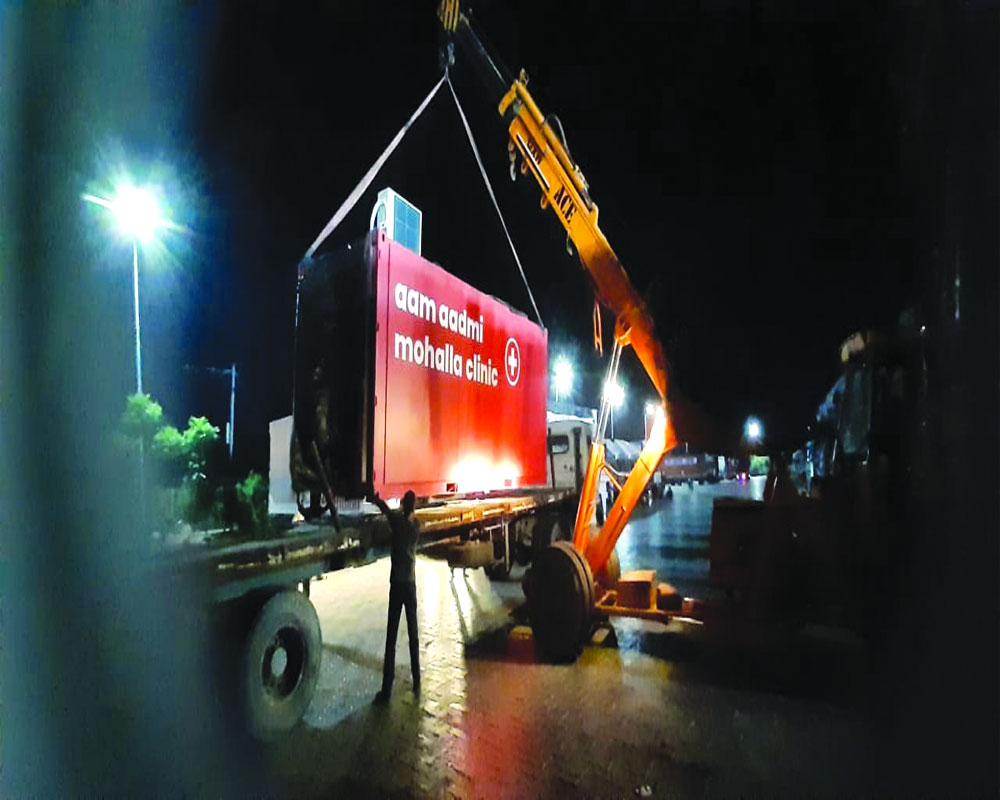Christy Varghese talks with Akshat Bhatt, the brains behind the novel, ‘portable’ Mohalla Clinics
When the Aam Aadmi Party (AAP) rose to prominence and formed the Delhi government in 2015, building 1,000 clinics was one of its primary promises. However, acquiring land for the Aam Aadmi Mohalla Clinics programme, in a congested Delhi, was one significant roadblock that came in the way of achieving such a promise. Only 500 Mohalla Clinics have been developed in the last six years, courting mixed reviews along the way.
While prestigious institutions such as the Stanford University, in its Social Innovation Review, and The Lancet, the renowned medical journal, expressed their appreciation at the Delhi government's move to offer free primary medical facilities through the neighbourhood clinics, there were others who criticised the capital territory's government for not being able to keep up with their pre-poll promises.
To address such criticism, and administer the services that fall within their purview as best as they can, the Delhi government announced last month that two new 'portable' Mohalla Clinics would be inaugurated shortly. And when these modular clinics were set up, in Shakur Basti and Rani Bagh, everyone had a lot of questions. The already innovative concept of Mohalla Clinics had received an ingenious twist — these were made out of what seemed like shipping containers at first glance, armed with air conditioning and other amenities.
Keeping aside the political shade of the event, while the government courted a lot of positive feedback for such an out-of-the-box initiative, little has been said about the brains behind this ingenuity. The clinic's design was developed by Architecture Discipline, a multi-disciplinary architectural practice founded by Akshat Bhatt in 2007, and set up with the support of Tata Power-DDL. Based in New Delhi, Architecture Discipline used upcycled shipping containers to provide a compact, portable, and sleek twist to the concept of Mohalla Clinics.
Salvaged from various container yards in Delhi and Haryana, two 20-foot-long containers were joined together to form a single clinic that includes an examination room, a reception and waiting area, a pharmacy that is accessible from outside, and a washroom. The clinic is fully equipped to support routine health checks, testing, and medicine purchasing, as per the state's Health minister, Satender Jain. These new-age Mohalla Clinics aspire to provide an affordable, space-efficient, and high-quality model of healthcare to all neighbourhoods in Delhi, especially in dense residential clusters that are hard-pressed for space and have limited access to healthcare facilities.
When we called in on Bhatt, the principal architect at Architecture Discipline, he offered to walk us through the thought-process behind the designing of these new models of the mohalla clinic, and the facilities provided.
“We have been experimenting with the use of shipping containers as a building material for a long time now, in typologies ranging from hotels to workspaces. Our own studio has an extension created out of a repurposed shipping container,” shared Bhatt animatedly.
He explained that such experiences had made the firm fairly proficient in the art of converting repurposed shipping containers into high-quality, usable spaces.
“Ever since the pandemic hit, we have been exploring the potential of containers in creating healthcare facilities. We designed the Life Community Medical Facility (LifeCMF), a concept for a modular healthcare facility built out of shipping containers that was presented at the London Design Biennale 2021. The Mohalla Clinics which have come up at Shakur Basti and Rani Bagh are a scaled-down version of LifeCMF, drawing on its central ideas of prefabrication, rapid deployability, and economic feasibility,” revealed Bhatt.
He pointed out that the clinics’ interiors are oriented towards creating a hygienic and optimistic patient friendly environment, with air-conditioning that is fitted with anti-viral filters and insulated walls that protect visitors from Delhi’s searing heat. Features such as the anti-microbial vinyl flooring and medical-grade stainless steel countertops are designed to be easy to maintain, he further shared.
“The clinic’s design capitalises on the structural strength of a discarded shipping container and works with it as a module, reducing the need for costly modifications or custom-built additions. In this manner, it redefines post-industrial waste as a medium for universal primary healthcare,” observed Bhatt.
With respect to the design related process, Bhatt explained that what they had in mind was that the end product should be capable of relocation at short notice. “Bearing in mind the congestion in a city like Delhi, we designed something which could be quickly deployed. In case of any emergencies or urgent requirement of a clinic at a location, we can relocate these clinics at short notice. The typical Mohalla Clinic occupies an area of about 720 square feet, our rendition of the clinic has everything that features in a typical clinic, within 350 square feet. And we haven’t achieved this in an haphazard manner, mind you. We have assigned dedicated spaces for doctor-patient interaction, waiting room etc while making allowances for acoustic comfort. Even though we toned it down to the bare-minimum, there are provisions for making the clinic disabled-friendly with a grated-ramp facility that can be installed. An ad-hoc ramp solution has also been built-in to each unit,” he said, to our wide-eyed wonder.
With the steadily increasing population, are modular spaces here to stay? Or are such instances just another novelty that will be less relevant with time? Only time can tell. However, in the meanwhile, the new clinics are something that would be welcomed by all Delhiites.


























